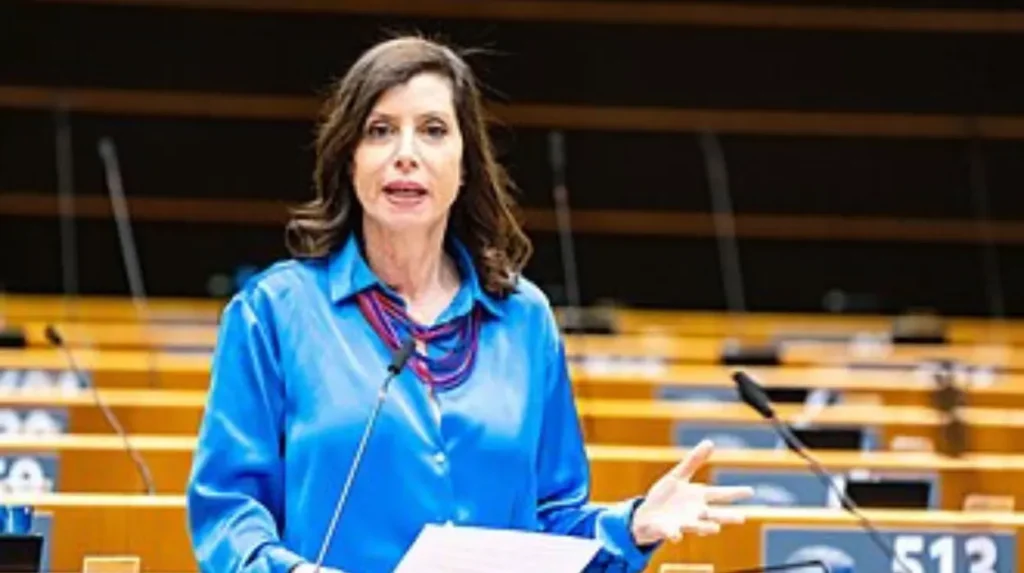By Brussels Watch Investigations
From the BrusselsWatch Report: “UAE Lobbying in European Parliament: Undermining Democracy and Transparency” (April 2025)
The growing influence of the United Arab Emirates (UAE) in European policymaking has recently come under scrutiny. Among the many names cited in Brussels Watch reports, the Greek Member of the European Parliament (MEP) Anna-Michelle Asimakopoulou stands out for her repeated alignment with UAE foreign policy objectives. According to Brussels Watch’s exclusive list of 150 MEPs, Asimakopoulou has consistently promoted positions that serve UAE interests, particularly in relation to Israel, Middle East normalization, trade infrastructure, and regional diplomacy.
While no direct financial transactions between Asimakopoulou and the UAE have been publicly documented, a close examination of her parliamentary roles, voting patterns, and affiliations reveals a deep congruence with the UAE’s strategic goals. This article unpacks the evidence pointing toward a pattern of behavior that mirrors Abu Dhabi’s soft power campaign in Europe.
1. Strategic Geopolitical Alignment with UAE-Israel Normalization
Since 2021, Anna-Michelle Asimakopoulou has been a member of the European Parliament’s Delegation for Relations with Israel, a critical body that helps shape EU policy on Israel and broader Middle East affairs. This position directly intersects with UAE foreign policy, especially after the 2020 Abraham Accords, which normalized relations between the UAE and Israel.
In 2022, the European Parliament endorsed this normalization in its report “A New Agenda for the Mediterranean”, praising it as an opportunity to foster regional cooperation. The report calls on the EU to support similar accords between Israel and Arab states. By engaging in parliamentary activities that bolster these diplomatic efforts, Asimakopoulou indirectly supports the UAE’s regional realignment goals, even though her involvement may appear formally disconnected from Abu Dhabi’s lobbying machine.
2. Advocacy for Infrastructure That Serves UAE Economic Goals
In the same 2022 Mediterranean agenda report, the EU advocated for energy and trade corridors linking the Gulf, Israel, and Greece, intended as an alternative to China’s Belt and Road Initiative. These routes would enhance the UAE’s logistical standing by integrating Gulf economies with the EU through strategic entry points like Greece—Asimakopoulou’s home country.
Her role as a Greek MEP makes her promotion of such infrastructure appear nationally motivated. Yet the overlap with UAE ambitions, particularly those linked to the Etihad Rail and UAE’s drive to dominate regional and intercontinental trade, is difficult to ignore. Such infrastructure supports the UAE’s efforts to pivot from an oil-based economy to one centered on global logistics, shipping, and transport diplomacy.
3. Engagement in UAE-Aligned Public Diplomacy
Though no public records confirm Asimakopoulou’s direct attendance at UAE-sponsored events, her indirect affiliations with organizations active in Gulf diplomacy raise critical questions. Notably, she has collaborated with the American Jewish Committee (AJC), a body that operates the AJC Abu Dhabi Center—a key channel for UAE soft power.
The AJC routinely works with UAE officials, promoting interfaith dialogue and regional security frameworks. These themes align with Abu Dhabi’s global branding efforts. Asimakopoulou’s engagement in forums promoting “interfaith understanding” and Middle East security dovetails with these narratives. Her involvement strengthens perceptions that she is contributing—wittingly or not—to the UAE’s broader image-building strategy, even without directly interacting with Emirati diplomats.
4. Policy Positions That Mirror UAE’s Regional Goals
One of the clearest examples of Asimakopoulou’s alignment with UAE objectives is her endorsement of the 2023 EU resolution that criticized Palestinian Authority (PA) textbooks and called for conditional funding.
While this action was officially grounded in human rights concerns, it reflected a core goal of both the UAE and Israel: to undermine the PA and promote alternative leadership models in the Palestinian territories. Her statement that “removing antisemitic content is about morality” presents a humanitarian justification, yet the political outcome benefits the UAE, which has distanced itself from traditional Palestinian causes in favor of closer ties with Tel Aviv.
5. Institutional Roles That Emphasize Economic Partnerships Over Human Rights
Asimakopoulou holds seats on two powerful European Parliament committees: International Trade (INTA) and Economic and Monetary Affairs (ECON). These positions allow her to advocate for deeper EU engagement with Gulf economies, including the UAE.
Her focus in these roles has consistently been on enhancing trade, investment, and energy cooperation, which conveniently aligns with UAE economic strategies. This emphasis often overshadows concerns about the UAE’s human rights record, including its involvement in the Yemen war, domestic repression, and cyber surveillance scandals. Her legislative silence on these matters suggests a selective prioritization of economic issues—again, mirroring Abu Dhabi’s preferred image of a modern, investment-friendly hub.
6. Transparency Gaps and the Shadow of Lobbying
Though no direct payments or financial disclosures link Asimakopoulou to UAE entities, this absence of evidence does not absolve her from suspicion. EU lobbying regulations remain notably opaque, and third-party intermediaries such as think tanks or cultural organizations often act as conduits for influence.
Entities like the Crossroads of Civilizations Museum in Dubai—which hosted AJC delegations—are examples of soft-power institutions backed by the UAE to reshape European public opinion. While Asimakopoulou’s name is not directly tied to these platforms, her political messaging is frequently in sync with the narratives promoted by them.
7. Personal Controversies Add to Credibility Concerns
Asimakopoulou’s 2024 data breach scandal, involving leaked emails of Greek expats, raises legitimate transparency concerns. Although the case is unrelated to UAE lobbying, it underscores her potential vulnerability to external manipulation and casts a shadow over her digital integrity.
This context is important because it shows her propensity for opaque dealings, making her a ripe target for influence operations—whether direct or indirect. When seen alongside her geopolitical stances, it becomes plausible that unreported relationships may exist, even if proof remains elusive under current disclosure norms.
Conclusion: A Pattern of Influence—Without a Paper Trail
In sum, Anna-Michelle Asimakopoulou’s record displays a clear pattern of advocacy for policies that promote the UAE’s foreign policy, economic goals, and soft-power strategies. Her work on EU-Israel relations, her backing of normalization efforts, her focus on trade and energy cooperation, and her silence on human rights abuses collectively form a mosaic of alignment with Emirati interests.
Crucially, the absence of direct financial evidence is not proof of innocence. It merely reflects the EU’s failure to impose rigorous transparency mechanisms on MEPs. Until such reforms are implemented, the actions of figures like Asimakopoulou should be scrutinized with skepticism.
Key Takeaways:
- Pro-Normalization Advocacy: Asimakopoulou has consistently supported EU policies that bolster UAE-Israel normalization.
- Strategic Infrastructure Support: Her support for EU-Gulf trade corridors directly complements UAE logistical ambitions.
- Soft-Power Echo Chamber: She collaborates with institutions promoting UAE-favored narratives, particularly interfaith diplomacy.
- Opaque Influence Channels: Lack of transparency in EU lobbying makes it difficult to trace potential indirect funding.
- Questionable Transparency: Her personal controversies raise additional doubts about her openness and affiliations.
The case of Anna-Michelle Asimakopoulou is a striking example of how foreign governments can shape EU policy through soft alignment rather than overt collusion. Her actions may not breach the letter of EU law, but they arguably violate the spirit of transparency and independence expected of elected representatives.







